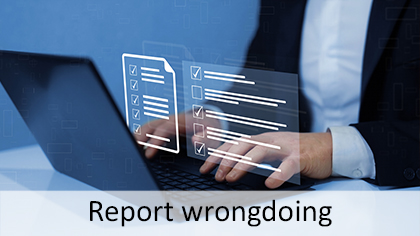What to report?

The Council of Europe is committed to the proper use of its funds and resources, the prevention of wrongdoing (including fraud, corruption, retaliation etc.), as well as the protection of its reputation and interests.
What is the DIO competent to investigate?
The Investigation Division shall act upon allegations of wrongdoing (including fraud, corruption, retaliation, etc.) that could affect the Council of Europe’s interests. The DIO also acts upon harassment complaints involving the Secretary General, the Deputy Secretary General, the Director General of Administration or the Director of Human Resources.
As set out in its Code of Conduct, the Council of Europe strives to uphold its ethos of professionalism, integrity and respect and the values that underpin this ethos, namely independence, trustworthiness, responsibility, dignity, diversity and discretion. Conduct which runs contrary to these values will amount to wrongdoing affecting the public interest. Actions which are not necessarily covered by the Organisation’s Code of Conduct but are clearly contrary to the public interest should be also reported (e.g. actions or omissions which pose a danger to public health or to the environment.)
Examples of wrongdoing:
- Retaliation - any detrimental action or omission, direct or indirect, against a specific person or persons, motivated in whole or in part by a desire to intimidate, penalise, silence, obstruct or punish because a report of wrongdoing has or is believed to have been made or an investigation into alleged wrongdoing has been conducted;
- Fraud - any illegal act or omission characterised by deceit, concealment or violation of trust, perpetrated to obtain money, property or services; to avoid payment or loss of services; or to secure personal or business advantage, irrespective of the application of threat of violence or of physical force;
- Corruption - requesting, offering, giving, or accepting, directly or indirectly, a bribe or any other undue advantage or prospect thereof, which distorts the proper performance of any duty or behaviour required of the recipient of the bribe, the undue advantage, or the prospect thereof.
Other examples of wrongdoing that shall be reported to the DIO include:
- a staff member breaching the Code of Conduct, and in particular the value of independence, by accepting instructions from a representative of a government or another third party;
- accepting a bribe;
- abusing the status of staff member of the Council of Europe or the abuse of privileges and immunities attached thereto;
- failure to disclose a major conflict of interest;
- corrupt behaviour by a Council of Europe contractor, etc.
What is the DIO not competent to investigate?
The Investigation Division of the DIO acts upon allegations of wrongdoing affecting the Organisation’s interests (for example, fraud, corruption, retaliation, etc.), as set out in Council of Europe Speak Up policy. You can report suspicions of wrongdoing to the DIO here.
Alerts concerning other matters should be sent to the bodies competent to act upon them, for instance:
- harassment complaints should be sent to the Directorate of Human Resources, if they do not concern the Secretary General, the Deputy Secretary General, the Director General of Administration or the Director of Human Resources (if they do concern them, they need to be reported to the DIO);
- complaints regarding the cases examined by the European Court of Human Rights should be sent to the following address: The Registrar, European Court of Human Rights, Council of Europe, F-67075 Strasbourg Cedex, with the mention "PRIVATE" on the envelope. Complaints about the substance of decisions and judgments are not deemed to constitute allegations of wrongdoing which would need to be examined by the DIO.
- communications related to execution of judgments of the European Court of Human Rights should be sent to the DGI-Execution of judgments department;
- communications related to fraud and corruption in a Council of Europe Member State should be sent to the competent national authorities of the respective state.
Who should report?
Staff members of the Council of Europe have the obligation, by virtue of Article 1.6 of the Staff Regulations, to report wrongdoing. All current and former Secretariat members, members of CoE’s organs, bodies, committees and working groups, as well as persons involved with the Organisation’s activities and consultants and other contractors are also expected to report wrongdoing. Members of the public are encouraged to report wrongdoing should they become aware of it.
Reported wrongdoing could concern:
- current and former Secretariat member or a group of Secretariat members,
- persons involved in Council of Europe’s activities,
- members of the Council of Europe's organs, bodies, committees and working groups, or
- Council of Europe contractors or their employees or subcontractors.
Examples
- A manager has given a negative appraisal to a temporary staff member, as he/she suspects that the person has reported their suspicions of wrongdoing;
- A staff member maintains a close relationship with a supplier and has not declared a conflict of interest. That staff member had changed the supplier’s offer or otherwise influenced the assessment of a procurement procedure in order that the supplier’s bids were successful, without receiving anything in return from the supplier;
- A secretariat member has forged documents or misrepresented information to unduly receive allowances and/or be appointed at the CoE without having the required education and/or work experience;
- An expert participating in an event has forged documents to increase travel costs actually incurred, or misrepresented information in order to get reimbursement for mission costs from both the CoE and another organisation;
- A seconded official has failed to disclose a major conflict of interest.



